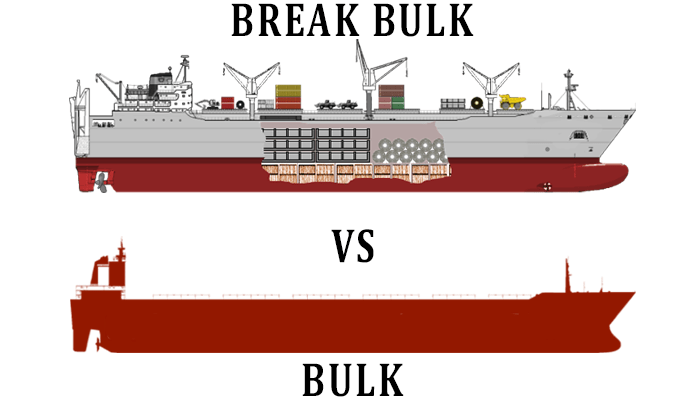Difference Between Bulk Cargo And Break Bulk Cargo
Some people are confused that, what is the difference between bulk cargo and break bulk cargo. It can be tough to decide which cargo container is the best for your business. Especially when it comes to shipping large items like furniture or appliances. Do you want a bulk cargo container that’s easy to move, or do you want something that’s more space-efficient? Here’s what you need to know about bulk cargo and break Bulk Cargo.
Bulk Cargo: This container is perfect for quickly and easily moving large items. They come in a variety of sizes, and they can be moved using a variety of methods. You don’t have to worry about loading and unloading the container, either—bulk cargo containers usually have an open top so you can access everything inside easily.
Break Bulk Cargo: On the other hand, break bulk cargo containers are designed for housing smaller items. They typically come in boxes, and they need to be unloaded one at a time.
What is Bulk Cargo and What is the Difference?
Bulk cargo is a type of containerized cargo that is larger and heavier than break bulk cargo. Break Bulk Cargo is a type of containerized cargo that is smaller and lighter than bulk cargo.
Bulk cargo refers to the physical containers that are shipped in large sacks or boxes. Break Bulk Cargo refers to digital files, pictures, videos, or other electronic media that are shipped in small packages.
How Does Bulk Cargo differ from Break Bulk Cargo?
Break Bulk Cargo often involves shipping more fragile materials like glass beads or crystal meth over long distances on trucks and barges instead of through the mail or air. This can lead to higher shipping costs as well as greater waste because break bulk cargoes must be transported in special packaging which can often require more manual labor than when using bulk cargo.
What is the Difference between Bulk Cargo and Break Bulk Cargo
There are several key differences between bulk cargo and break bulk cargo that can impact shipping costs:
- Bumpers: When a container falls out of an airplane while in flight, it can havoc havoc havoc havoc havoc havoc havoc (atomic explosion) on the airplane’s hull and create huge damage! The FAA requires all airports to have some form of bumpers to prevent this from happening, so it’s important for airlines to understand what type of material they’re transporting and plan accordingly – break bulk cargos without bumpers cost less but may also result in more damage due to accidental contact with other objects during transport.
- Lube: Bulk cargo may often include a high level of lubricants and other materials that are not as compatible with the oils and solvents used in break bulk cargo. This can lead to higher shipping costs due to having to transport incompatible materials in separate containers.
- – Cargoes with less perishable material (like seafood) tend to require less careful handling when arriving at their destination, leading to less waste (and sometimes lower shipping costs).
What are the Benefits of Investing in Bulk Cargo?
Bulk cargo can help reduce the amount of waste that is produced when traveling. By carrying more goods in one place, bulk cargo can save energy and money. Additionally, Bulk Cargo can help protect the environment by reducing the amount of plastic used for packaging goods.
Environmental Responsibility: Bulk Cargo Protects the Environment
Bulk cargo also has a responsibility to protect the environment. By taking into consideration the effects that shipping and handling have on both the environment and human health, bulk cargo can make sure that it does its part to protect our planet from negative consequences.
Economic Efficiency: Bulk Cargo Can Reduce Costs
By investing in bulk cargo, businesses are able to reduce costs associated with shipping and handling by packing their items more efficiently into smaller containers. This will free up money that can be used to improve other areas of business or invest in new technology or products.
How to Invest in Bulk Cargo.
One way to invest in bulk cargo is to buy it outright. This option is often the most cost effective and can provide you with a long-term investment. To buy bulk cargo, go online or in-person to find a supplier. Be sure to read the packaging and safety instructions before purchasing so you know what you’re getting into.
If you choose to lease Bulk Cargo, make sure to do your research and compare prices carefully. Many providers offer short leases that expire after a certain amount of time, so be sure to plan ahead!
Rent or lease Bulk Cargo
Another option for investing in bulk cargo is to rent it out. This will allow you to store your goods at different locations and use them as needed, rather than having them in Constant Storage all the time. In addition, renting Bulk Cargo can help reduce your total storage costs.
Use Bulk Cargo to store goods
Another option for using Bulk Cargo is as an inventory storage solution. By storing items in Bulk Cargo, you can reduce their need for space and save money on storage fees each month or year. Additionally, by using backup plans for your cargo, you can be confident that your goods will be okay if something goes wrong during transit or when stored outside of the United States (although this is not recommended).
Conclusion
Bulk Cargo is a great way to reduce waste and create environmental responsibility. It can also be used to store goods efficiently, saving you money in the process. If you’re interested in investing in bulk cargo, it’s important to buy it from a reliable source and use it efficiently. By following these simple steps, you can increase your business’ efficiency and save money.
FAQs
Q1. What is a Customs House Agent?
A1. A Customs House Agent is a professional who manages the administrative and legal requirements of customs authorities and serves as an intermediary between importers, exporters, and customs officials.
Q2. How can I find a Customs House Agent in my country?
A2. To find a Customs House Agent in your country, you can search online or contact your local customs office for a list of authorized agents. You can also get recommendations from regional businesses or trade organizations.
Q3. What is the role of a Customs Agent?
A3. The role of a Customs Agent is to ensure that items are cleared through customs on time and in a compliant manner, which helps to facilitate international trade. They are responsible for ensuring all documentation related to the shipment of goods is accurate and complete.
Q4. How much does a Custom House Agent earn in India?
A4. The earning of a Custom House Agent in India may differ based on their education, location, experience, and the type of cargo they handle. At the entry-level, the salary is between Rs. 2.5 and 4 lakhs per year, but it may increase with experience to Rs. 6–10 lakhs or more annually.
Q5. How can I verify the credentials of a Custom House Agent in India?
A5. To verify the credentials of a Custom House Agent in India, you can check their license, experience, and reputation in the field before hiring them. You can also examine the costs and services provided by several agencies before making any decision.



Leave us a comment